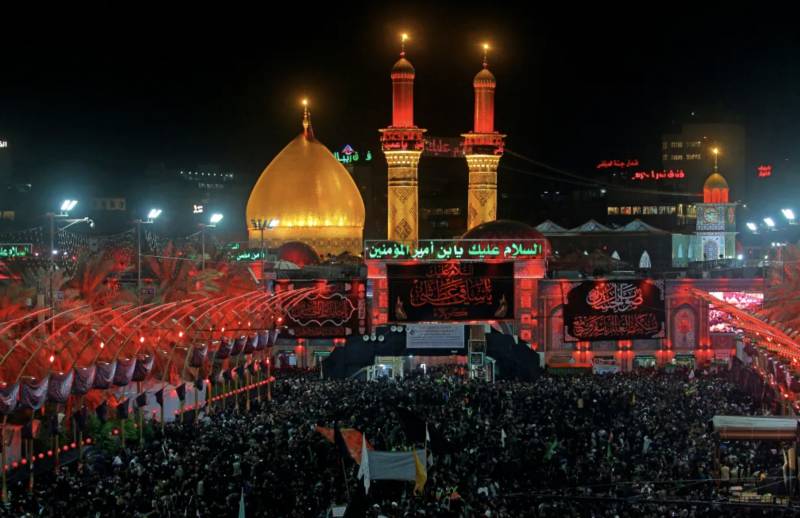
“The tyrant dies and his rule is over, the martyr dies and his rule begins.”—Soren Kierkegaard
All around the world one comes across innumerable memorials set up to commemorate soldiers who laid down their lives in the defense of their land and people. Their names are conspicuously etched on epitaphs in eternal memory so that future generations dare not forget their sacrifices in allowing them the opportunity to carry on a peaceful existence or upholding the flag of an ideology. Such is the power of conviction and commitment to one’s cause, which attains perpetuity over those who use unfair means for its subjugation. These evil-doers are also remembered, but only with disgust and abhorrence.
Within 38 years of the departure of the Prophet Muhammad (PBUH) from the world, the hypocrites among his followers had the audacity to spill the blood of his own kith and kin (Ahl-e-baith) with extreme barbarism. In a bid to hijack the growing influence of Islam and exploit its teachings for their own nefarious purposes, the rulers of the day found in the holy Prophet’s (PBUH) beloved grandson Imam Husain (AS) an inviolable resistance who emphatically criticized their unstoppable attempts to corrupt the Quranic words and distort the teachings of Holy Prophet (PBUH). He became a formidable force from whom submission to Yazid (then usurper Khalifah) was being demanded.
On taking a stand, the family of the holy Prophet (PBUH) was being continuously persecuted. The reign of brutal suppression, in utter violation of the Islamic principles, by the tyrannical ruler and his associates prompted the citizens of Kufa to invite Imam Husain (AS) in order to rid them of Yazid. What happened after that has culminated in the observance of martyrdom of the Imam (AS) along with members of his family and close associates year after year and all across the globe.
For Muslims, this event signifies an important chapter of the Islamic history that helped to establish right from wrong, truthfulness from falsity, faithfulness from hypocrisy and above all righteousness from sin. The gruesome nature of this event has had such an impact on the enlightened people that even non-Muslims could not resist crying out for the pain and misery that the family of the holy Prophet (PBUH) had been subjected to, eulogizing their supreme sacrifice. To this day his name is taken with reverence while Yazid and his henchmen are cursed for their shamelessness and acts of extreme cruelty sparing neither children nor women or the elderly.
Edward G. Browne, professor of Arabic and oriental studies at the University of Cambridge, in his book A literary history of Persia on page 227, praises Imam Husain (AS) in these words:
Thomas Carlyle, a Scottish historian and essayist while emphasizing the power of having faith in God, explains: “The best lesson which we get from the tragedy of Karbala is that Husain and his companions were rigid believers in God. They illustrated that the numerical superiority does not count when it comes to the truth and the falsehood. The victory of Husain, despite his minority, marvels me!”
If Imam Husain’s (AS) objective was to battle against his opponents, he would not have taken along with him, his womenfolk and small children. The very fact that they were with him proves his humility in keeping aloft his grandfather’s message of peace. The famous English novelist, Charles Dickens writes: “If Husain had fought to quench his worldly desires…then I do not understand why his sister, wife, and children accompanied him. It stands to reason therefore, that he sacrificed purely for Islam.”
Human history has witnessed innumerable battles but Karbala stands out as one where a handful of men, women and children remained steadfast with Imam Husain (AS) amid horrendous moments of torture and anguish. Dr. K. Sheldrake (1888-1947), a British born pickle manufacturer who converted to Islam writes: “Of that gallant band, male and female knew that the enemy forces around were implacable, and were not only ready to fight, but to kill. Denied even water for the children, they remained parched under the burning sun and scorching sands, yet not one faltered for a moment. Husain marched with his little company, not to glory, not to power of wealth, but to a supreme sacrifice, and every member bravely faced the greatest odds without flinching.”
Antoine Bara, a Christian Lebanese poet and vociferous admirer of the Imam says: “No battle in the modern and past history of mankind has earned more sympathy and admiration as well as provided more lessons than the martyrdom of Husayn in the battle of Karbala.”
Even famous men and women of the Indian subcontinent were full of accolades for Imam Husain (AS) and his faithful followers. The tragedy of Karbala and its spirit of non-violent resistance and supreme sacrifice has been a source of inspiration for many renowned leaders. Mahatma Gandhi’s first Salt Satyagraha was inspired by Imam Husain’s (AS) non-violent resistance to the tyranny of Yazid. It is believed that Gandhi studied the history of Islam and Imam Husain (AS), and was of the opinion that Islam represented not the legacy of a sword, but of sacrifices of saints like Imam Husain (AS).
The great poet Rabindranath Tagore, considered Imam Husain’s (AS) sacrifice as indicative of spiritual liberation. He said, “In order to keep alive justice and truth, instead of an army or weapons, success can be achieved by sacrificing lives, exactly what Imam Husain (A.S.) did.”
Rajendra Prasad said, “The sacrifice of Imam Husain (AS) is not limited to one country, or nation, but it is the hereditary state of the brotherhood of all mankind.” Swami Shankaracharya opines: “It is Husain’s (AS) sacrifice that has kept Islam alive or else in this world there would be no one left to take Islam’s name.”
And finally the most emphatic statement comes from Dr, Radha Krishnan who said: “Though Imam Husain (AS) gave his life almost 1,300 years ago, but his indestructible soul rules the hearts of people even today.”

